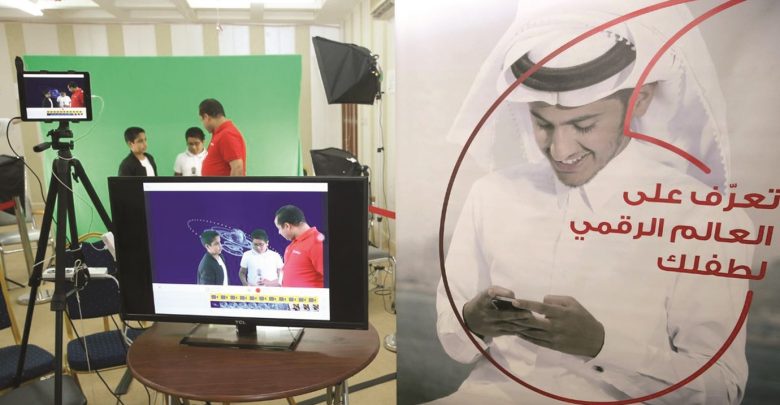
Vodafone AmanTECH research shows digital trends among children
بحث جديد لـ «امان تيك» من «فودافون قطر» حول الأطفال والسلامة الرقمية
Vodafone Qatar’s award-winning online safety programme, AmanTECH, is continuing to engage children on the subject of digital safety and its latest research findings clearly shows a number of gaps to address.
In parallel to AmanTECH’s many community engagements, Vodafone Qatar, in partnership with the Ministry of Transport and Communications (MoTC), has been delivering online safety workshops at primary schools since late 2017.
To date, 30 workshops have been conducted for close to 3,000 students aged three to eight, with plans to conduct 20 more before the end of 2019. In each workshop, the children are required to perform tasks related to safety online to learn specific skills, including identifying fake news vs real, safe online gaming, how to deal with cyber bullying and reputation online.
At the end of each workshop, the pupils complete an electronic survey on their use of technology, games, videos, and social media.
At the last 20 workshops, in which 1,761 children were surveyed, it revealed that 32% of pupils reported that they spend at least eight hours online per day, the most popular activity is watching videos (40%), followed by playing games (23%), and social media (21%), game consoles are the most popular platform for gaming (45%) with sports games being the most popular (29%) followed by shooter games (27%).
Encouragingly, over a third of the children in this age range would ask their parents to see if a game is suitable (35%) but the awareness of games’ rating system stood only at 18%. Most children use Google (42%) and video sites like YouTube (41%) to find videos to watch with age-appropriate video sites like Youtube Kids is uncommon (9%), and most young people were aware of the risks of meeting with online friends.
Also, 50% said they would tell parents if a stranger online wanted to meet them, while 35% said they would tell the person they were not comfortable. Worryingly, 6% said they would arrange a secret meeting on their own, while 11% said they would go to the meeting, but take a friend.
Responses to online bullying were mixed: 31% would send back mean messages and 14% would keep quiet about it, while 31% would block the bully and only 21% would tell a teacher or parent. Forty six percent of children thought their parents were concerned about too much time online.
Mohamed al-Yami, director of External Affairs at Vodafone Qatar, said: “Qatar is one of the most connected countries in the world and children are exposed to technology from a very young age.
“As a leading digital company, it is our duty to ensure that children are given the opportunity to make the most of communication technologies for their development while also instilling healthy and safe online habits.” He added: “Our work through AmanTECH has touched thousands of children and members of the community but there is much to do to raise awareness about digital safety and our research clearly shows a number of gaps.
For a start, communication between parents and children is often limited to parents trying to get children off screens.
“A wider and more open conversation is needed about screen use and some of the risks involved. This would make children more likely to talk to parents when issues arise – for example seeing upsetting content online, which only 39% of children said they would tell an adult about.”
The AmanTECH programme includes ongoing workshops, an online source for information and tips for parents accessible at www.vodafone.qa/AmanTECH
يواصل «AmanTECH» -برنامج «فوادفون قطر» للسلامة في العالم الرقمي- استقطاب مزيد من الأطفال حول موضوع السلامة الرقمية، وتكشف نتائج بحثه الأخير عن العديد من الثغرات التي ينبغي معالجتها. وبالتوازي مع الأنشطة المجتمعية لبرنامج «AmanTECH»، دأبت «فوادفون قطر» -وبالتعاون مع وزارة المواصلات والاتصالات- على تنظيم العديد من ورش العمل في المدارس الابتدائية حول موضوع السلامة في العالم الرقمي منذ أواخر عام 2017.
نُظّمت 30 ورشة عمل لنحو 3 آلاف طالب من الصف الثالث إلى الثامن، مع خطط لتنظيم 20 ورشة عمل أخرى قبل نهاية عام 2019. وفي كل ورشة عمل، يُطلب من الأطفال إنجاز عدد من المهام المتعلقة بالسلامة على الإنترنت بهدف إتقان مهارات محددة، مثل تمييز الأخبار الحقيقية من الزائفة، وممارسة ألعاب الإنترنت بشكل آمن، وكيفية التعامل مع حالات التنمر السيبراني وحماية السمعة وغيرها.
وفي نهاية كل ورشة عمل، يقوم التلاميذ باستكمال استبيان إلكتروني حول استخدامهم للتكنولوجيا، والألعاب، والفيديوهات، ووسائل التواصل الاجتماعي. وفي ورش العمل العشرين الأخيرة التي استُطلعت خلالها آراء 1761 طفلاً، تبيّن ما يلي:
• قال 32% من الأطفال إنهم يمضون
8 ساعات على الأقل يومياً في استخدام الإنترنت.
• النشاط الأكثر انتشاراً بين الأطفال هو مشاهدة مقاطع الفيديو (40%)، يليه الألعاب الإلكترونية (23%)، ثم تصفّح منصات التواصل الاجتماعي (21%).
• تُعدّ أجهزة تشغيل الألعاب (consoles) هي المنصات الأكثر استخداماً للألعاب الإلكترونية (45%)، وتأتي الألعاب الرياضية في الصدارة بنسبة (29%)، تليها الألعاب الحربية (27%). والمشجع في الأمر أن أكثر من ثلث الأطفال في هذا السن يطلبون نصح ذويهم بشأن الألعاب المناسبة لهم (35%)، ولكن مستوى الوعي بشأن نظام التصنيف العمري للألعاب لا يتجاوز 18%.
• معظم الأطفال يستخدمون محرك البحث «Google» (42%) ومواقع الفيديو مثل «Youtube» (41%) لإيجاد الفيديوهات التي يريدون مشاهدتها، علماً بأن مواقع الفيديوهات المناسبة لفئتهم العمرية مثل «Youtube Kids» غير شائعة الاستخدام (9%).
• معظم اليافعين يدركون حجم المخاطر المرتبطة بالتعرف على أصدقاء عبر الإنترنت. وقال 50% منهم إنهم سيخبرون ذويهم إذا أراد شخص غريب التعرف عليهم عبر الإنترنت، و35% قالوا إنهم سيخبرون الشخص نفسه بعدم ارتياحهم نحوه، بينما قال 6% إنهم سيقابلونه دون علم أحد، و11% قالوا إنهم سيذهبون للقاء الشخص الغريب ولكن برفقة أحد الأصدقاء.
• تفاوتت الردود حول مسألة التنمر عبر الإنترنت، حيث قال 31% إنهم سيردّون على العبارات المسيئة بمثلها، وقال 14% إنهم سيلزمون الصمت حيالها، وأشار 31% إلى أنهم سيقومون بحظر الشخص المتنمر، وقال 21% إنهم سيخبرون المعلم أو الأهل.
• يعتقد 46% من الأطفال أن تمضية معظم وقتهم على الإنترنت يشكّل مثار قلق لوالديهم.
تقدم
وقال محمد اليامي، مدير الشؤون الخارجية في شركة «فودافون قطر»: «تُعدّ قطر واحدة من أكثر دول العالم تقدماً في مجال الاتصالات، وهذا يفتح الباب أمام استخدام الأطفال للتكنولوجيا منذ سن مبكرة. وباعتبارنا إحدى الشركات الرقمية الرائدة في البلاد، فمن واجبنا إتاحة الفرصة أمام الأطفال للاستفادة من تقنيات الاتصال لتطوير قدراتهم ومهاراتهم، مع الحرص في الوقت نفسه على ترسيخ عادات صحية آمنة لاستخدام الإنترنت».
وأضاف اليامي: «أتاح لنا برنامج (AmanTECH) التواصل مع آلاف الأطفال وأفراد المجتمع، ولكن لا يزال أمامنا الكثير لزيادة الوعي حول السلامة الرقمية في ضوء الثغرات التي كشف عنها بحثنا الأخير. وفي البداية، غالباً ما يقتصر التواصل بين الأهالي والأطفال على محاولة تقليل استخدام الأطفال للشاشات الإلكترونية، وهذا يتطلب من الأهالي إجراء حوار موسّع ومنفتح مع أبنائهم حول الأجهزة الرقمية ومخاطر استخدامها لفترات طويلة. ومن شأن ذلك أن يشجع الأطفال للحديث مع أهاليهم حول المشاكل التي قد تعترضهم، ومنها -على سبيل المثال- رؤية محتوى غير لائق عبر الإنترنت، خصوصاً وأن 39% من الأطفال فقط قالوا إنهم سيخبرون أحد البالغين في حال مشاهدة مثل هذا المحتوى».;



